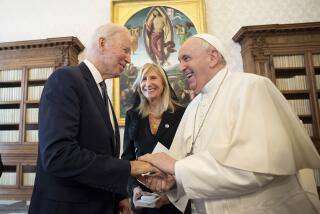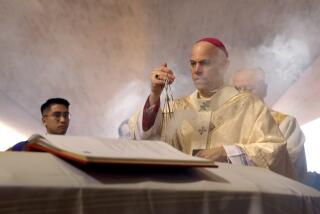Bishops Urge U.S. to Transition Out of Iraq
Declaring that the United States was at a crossroads in Iraq, the nation’s Roman Catholic bishops said Thursday the time had come to withdraw U.S. troops as fast as responsibly possible and to hand control of the country to Iraqis.
“Our nation’s military forces should remain in Iraq only as long as it takes for a responsible transition, leaving sooner than later,” said Bishop Thomas G. Wenski of Orlando, Fla., speaking for the U.S. Conference of Catholic Bishops.
Wenski, chairman of the bishops Committee on International Policy, said recent statements by the Bush administration that troop levels would be reduced were not enough. He said the U.S. must send an unmistakable signal that the goal was not to occupy Iraq “for an indeterminate period,” but to help Iraqis assume full control of their government.
The eight-page statement, in the works for months and delivered to the White House and members of Congress on Thursday, was candid in its assessment of the war, which U.S. bishops and the late pope, John Paul II, had opposed from the start.
It underscored failures but also highlighted successes in the nearly three years since the U.S.-led invasion. Weapons of mass destruction were not found; more than 2,200 American troops and tens of thousands of Iraqis have been killed; U.S.-held prisoners were tortured and mistreated; and violence was continuing in the streets.
The bishops said they remained “highly skeptical” of Bush’s doctrine of “preventive war.” But they also saw signs of hope, including the Iraqi elections.
“Our nation cannot afford a shrill and shallow debate that distorts reality and reduces the options to ‘cut and run’ versus ‘stay the course,’ ” Wenski wrote, speaking for the bishops conference.
In an interview Thursday, Wenski said the bishops purposely decided to avoid the word “withdrawal” in favor of “transition” to avoid the impression that bishops were advocating that the U.S. “cut and run.”
“No matter what the debate might have been about going into Iraq, now that we are there, our presence gives us a whole set of new moral obligations that we have to try to fulfill in a responsible way,” Wenski said.
“Our nation is at a crossroads in Iraq,” the statement said. “We must resist a pessimism that might move our nation to abandon the moral responsibilities it accepted in using force, and might tempt us to withdraw prematurely from Iraq without regard for moral and human consequences.
“We must [also] reject an optimism that fails to acknowledge clearly past mistakes, failed intelligence, and inadequate planning related to Iraq, and minimizes the serious challenges and human costs that lie ahead,” it said.
John Carr, a senior staffer on the Catholic bishops committee, said the statement was intended to set the stage for what bishops hoped would be a vigorous but civil discussion on what the U.S. must do next.
“Candidly, there seems to be more talk on Sunday morning TV talk shows than there is in the Congress or within the Bush administration, at least in the public sense,” Carr said. “The great temptation is to try to justify past policies instead of acknowledging where we are and what we need to do.”
On Thursday, Catholic bishops forcefully restated their abhorrence to torture and said the U.S. must live up to constitutional protections against cruel and unusual punishment, and abide by international accords outlawing torture.
Bishops were careful not to criticize U.S. troops. By raising “grave moral questions” about the decision to invade Iraq, bishops said they were not questioning “the moral integrity of those serving in the military.”
Bishops also called for religious freedoms in Iraq, including tolerance for non-Muslims, and the protection of Iraqi refugees and asylum seekers.
They said that as the U.S. pursued the war on terrorism and the rebuilding of Iraq, it should not forget pressing concerns at home and abroad, particularly caring for the poor.
More to Read
Sign up for Essential California
The most important California stories and recommendations in your inbox every morning.
You may occasionally receive promotional content from the Los Angeles Times.










